|
|
|
Sort Order |
|
|
|
Items / Page
|
|
|
|
|
|
|
| Srl | Item |
| 1 |
ID:
146174


|
|
|
|
|
| Summary/Abstract |
Comparative analyses of non-Western intelligence communities have been relatively few. Those that exist have tended to involve the United States as a baseline for comparison. In fact, Intelligence Studies as an academic discipline has been so dominated by American and English perspectives and conceptualizations that the informal term “Anglosphere” has emerged. Moreover, most non-American investigations of intelligence, whether comparative or single case studies, tend to be anecdotal and largely historical. And even these tend to be pushed through the lens of Western intelligence definitions and concepts. Very little exists—at least in English translation—that tries to examine the intelligence cultures of non-Western intelligence communities from their own political perspectives and national security priorities.
|
|
|
|
|
|
|
|
|
|
|
|
|
|
|
|
| 2 |
ID:
083729
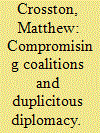

|
|
|
|
|
| Publication |
2008.
|
| Summary/Abstract |
This article investigates the development of democracy in Tajikistan and analyzes what has earned it the most international acclaim: its secular-Islamic governing coalition. The investigation reveals a compromised and illegitimate coalition that, with American collusion in local regime repression, poses great dangers to international security. The article argues that government repression, leading to increasing radicalization, combines with foreign aid to damage long-term democracy potential in Tajikistan but also works against global security interests by creating doubt about American intentions and possibly allowing a concomitant rise in Islamic radicalism
|
|
|
|
|
|
|
|
|
|
|
|
|
|
|
|
| 3 |
ID:
073934


|
|
|
|
|
| Publication |
Aldershort Publishing Limited, 2006.
|
| Description |
186p.
|
| Standard Number |
0754646327
|
|
|
|
|
|
|
|
|
|
|
|
Copies: C:1/I:0,R:1,Q:0
Circulation
| Accession# | Call# | Current Location | Status | Policy | Location |
| 051679 | 327.73058/CRO 051679 | Main | On Shelf | Reference books | |
|
|
|
|
| 4 |
ID:
154331
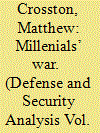

|
|
|
|
|
| Summary/Abstract |
This work is about how the United States military has become dependent on networked technology. As arguably the largest contributor to national security, it has become so dependent that its chief doctrine integrates networked technology into nearly every specialty, with particularly intense focus on Network Centric Warfare. As the military’s old guard is replaced by the highly technical Millenial Generation, there is cause to pause when assuming this techno-acuity brings nothing but advantage and success. Vulnerabilities stemming from such extensive dependence offer opportunities for exploitation that have not gone unnoticed. The first step to moving forward from this point is to fully understand the extent to which the military has become dependent on computer networks. It might be the Millenials’ war today, but it would be quite unwise for the United States military to think about it and fight it in a purely Millenial way.
|
|
|
|
|
|
|
|
|
|
|
|
|
|
|
|
| 5 |
ID:
086413
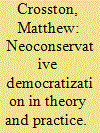

|
|
|
|
|
| Publication |
2009.
|
| Summary/Abstract |
Neoconservative democratization took on new life after 9/11: the United States should be a global guarantor of liberty, even if coercing this freedom. The justification was a hybrid of liberal democratic peace and realist national security. However, this aggressive democratization is contradictory: the philosophical foundation is insincerely decorated by liberal language that overlooks damaging compromises when ideology is put into practice. Uzbekistan, with whom a close partnership in the war against terror was developed and then was further deepened along supposedly democratic development lines, is used as a critical case study. In short, the contradictions in neoconservative ideology create flaws in policy implementation that do not create smoother paths to development, prevent democratic consolidation and weaken American security interests.
|
|
|
|
|
|
|
|
|
|
|
|
|
|
|
|
| 6 |
ID:
175598


|
|
|
|
|
| Summary/Abstract |
The surprise nomination by President Trump of Gina Haspel, a 33-year veteran of the Central Intelligence Agency (CIA), to become the agency’s first female director marks an opportunity to review where the CIA stands on issues of gender equity and advancement. Going back to 1953, when a group of CIA women was empowered by Director Allen Dulles to perform an internal review that assessed pay and rank disparities between male and female employees, a less-than-stellar gender reality has existed. Nicknamed the Petticoat Panel, it uncovered that the median grade for women was a GS-5, while for men it was a GS-9. More disappointing, not a single woman was found to be employed in senior executive service.
|
|
|
|
|
|
|
|
|
|
|
|
|
|
|
|
| 7 |
ID:
122301
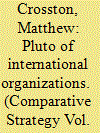

|
|
|
|
|
| Publication |
2013.
|
| Summary/Abstract |
This article investigates the peculiarities of the Shanghai Cooperation Organization (SCO). Unlike many more famous international organizations (IOs), the SCO is dominated by micro-agendas that seem to run counter to most of the theoretical literature applicable to IOs. This analysis examines these internal machinations and divergent interests through the theoretical lens, breathing new relevance into the institutional skepticism of Mearsheimer. Consequently, the SCO should not be considered a legitimate IO as traditionally framed. As such, it might be the "Pluto" of IOs that needs renaming and removal from the classification of IOs.
|
|
|
|
|
|
|
|
|
|
|
|
|
|
|
|
| 8 |
ID:
172931
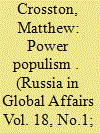

|
|
|
|
|
| Summary/Abstract |
In traditional understandings of classical populism, power is commonly
defined as being in need of devolving from the corridors of power and
out to a more grassroots foundation. At its core, populism was usually
seen as a belief in empowering regular people. ‘Regular people’ were
typically defined as being disconnected, if not outright disenfranchised,
from central power and outside the realm of the ‘elite.’ This paper
investigates the modern phenomenon in Russia and America that turns
these traditional concepts completely on their head. Rather than being
a movement engineered against elite political insiders, populism in
America and Russia currently seems to be occupied by the elites of
society. Ironically, these elites position themselves as the chosen
representatives of the disenfranchised. These strange bedfellows have
arguably produced a new form of ‘power populism’: instead of being
focused on removing power from the state, this populism is founded
more upon strengthening the global position of the state while tacitly
dismissing/attacking the perceived intellectual elite of each society.
|
|
|
|
|
|
|
|
|
|
|
|
|
|
|
|
|
|
|
|
|